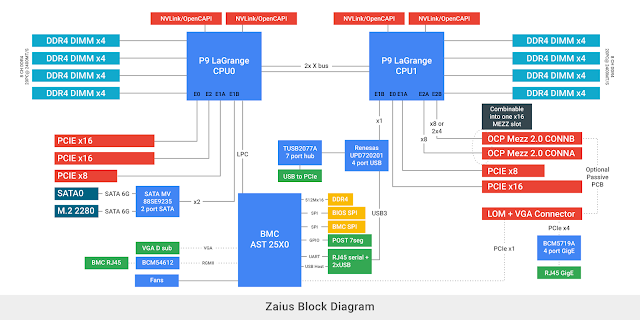Posted by John Zipfel, Technical Program Manager
Here at Google Cloud, our goal is to enable our users and customers to be successful with options, high performance and value. We’re committed to open innovation, and look forward to working with industry partners on platform and infrastructure designs.
In fact, earlier this year, we announced that we would collaborate with Rackspace on the development of a new Open Compute Project (OCP) server based on the IBM POWER9 CPU. And we recently announced that we joined the OpenCAPI Consortium in support of the new open standard for a high-speed pathway to improve server performance. Today, we’re excited to share the first spec draft of our new server, Zaius P9 Server, which combines the benefits of IBM POWER9 and OpenCAPI for the OCP community.
Over the past few months, we’ve worked closely with Rackspace, IBM and Ingrasys to learn about the needs of the OCP community and help ensure that Zaius is useful for a broad set of users. With Zaius, Google is building upon the success of the Open Server specification and Barreleye platforms, while contributing the 12 years of experience we’ve gained from designing and deploying servers in our own data centers.
Zaius incorporates many design aspects that are new to Google and unique to OCP: POWER9 was designed to be an advanced accelerated computing platform for scale-out solutions, and will be available for components that use OpenCAPI and PCIE-Gen4 interfaces. The Zaius design brings out all possible PCIe Gen4 and OpenCAPI lanes from the processors to slots and connectors for an unprecedented amount of raw bandwidth compared to prior generation systems. Additionally, the updated package design reduces system complexity and the new microarchitecture provides increased efficiency and performance gains.
Block diagram of Zaius
The specifications
Zaius is a dual-socket platform based on the IBM POWER9 Scale Out CPU. It supports a host of new technologies including DDR4 memory, PCIE Gen4 and the OpenCAPI interface. It’s designed with a highly efficient 48V-POL power system and will be compatible with the 48v Open Rack V2.0 standard. The Zaius BMC software is being developed using Open BMC, the framework for which we’ve released on GitHub. Additionally, Zaius will support a PCIe Gen4 x16 OCP 2.0 mezzanine slot NIC.
We’ve shared these designs with the OCP community for feedback, and will submit them to the OCP Foundation later this year for review. Following this specification, we plan to release elements of the board’s design collateral, including the schematics and layout. If accepted, these standards will continue the goal of promoting 48V architectures. This is a draft specification of a preliminary, untested design, but we’re hoping that an early release will drive collaboration and discussion within the community.
We look forward to a future of heterogeneous architectures within our cloud. And, as we continue our commitment to open innovation, we’ll continue to collaborate with the industry to improve these designs and the product offerings available to our users.
Quelle: Google Cloud Platform

Published by